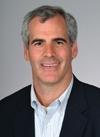|
by Cindy Abole
Public Relations
There's nothing more
important to Charleston native G. Thomas
Finnegan III than to see MUSC's campus and
the Lowcountry area grow to become a
hotbed for discovery, innovation and
entrepreneurial activity.
Finnegan, a successful
biotech entrepreneur, inventor and
investor with real-world technology
commercialization experience, was
recruited to MUSC to work with faculty and
the research community.
 Tom
Finnegan Tom
Finnegan
He plans to identify
promising discoveries in biotechnology
research, medical devices and
applications, and new therapies that can
improve health outcomes in order to create
commercial applications and products or
create start-up companies. He wants to
expand the institution's commercialization
pipeline by marketing and promoting
technology to industry, licensing and
drafting tech transfer agreements as well
as providing business support to
researchers.
Finnegan is the
director of MUSC's new Center for
Innovation and Entrepreneurialism. The
center was established under the
recommendation of MUSC leadership,
research directors and guidance from
MUSC's Strategic Plan.
Finnegan feels that
about 20 percent of faculty, as well as
students, already embrace an
entrepreneurial spirit through their
research work and activities. But, he
feels that MUSC has fallen behind compared
to other institutions in benefitting from
commercialized discoveries and licensing
income. "It's these people that I want to
connect with and talk to so I can help
those who are ready to move their research
ideas and clinical innovations to the next
level," he said.
"Entrepreneurialism
isn't about just licensing technology;
it's about helping people work better,
quicker, smarter and more efficiently.
It's this outside-of-the box thinking that
achieves results. The great thing about
entrepreneuralism is everybody wins and
contributes to the greater good, which is
advancing science. Bottom line, it takes
mney to get things done well."
Since setting foot on
campus in August, Finnegan has been busy
telling faculty and research groups his
own story as a life sciences professional
that owns and manages licensed
technologies connected with MUSC and other
institutions. He said he sees himself as a
catalyst — someone who encourages an
entrepreneurial culture at MUSC and
throughout the state.
As research
universities and academic health care
institutions struggle with smaller
budgets, reduced federal and state funding
and limited private support, faculty are
realizing that it's tough to advance their
research and discoveries. According to
Finnegan, if an organization reduces costs
that are deemed entrepreneurial or
innovative, they added more dollars to
their bottom line to conduct research.
"Everyone can be
entrepreneurial. I'd like to provide an
avenue for more people who want to go in
this direction, to think this way," said
Finnegan, who often defends the general
stereotype of successful entrepreneurs.
"Entrepreneurs aren't risk-taking
mavericks who only know how to run and
startup companies. On the contrary, many
are innovators, who are calculated risk
takers, who share a vision, drive,
intelligence and strong work ethic."
Finnegan believes that
not everyone is cut out to be an
entrepreneur. He challenges faculty to do
their part and seek alternative ways to
support the entrepreneurial process by
sharing ideas with colleagues, networking,
participating with a clinical trial, etc.
Finnegan came to MUSC
by way of Austin, Texas where he was vice
president of finance for Introgen
Therapeutics and went on to start up and
manage several biotech companies. He
graduated from the University of South
Carolina in Columbia with a degree in
finance and real estate in 1990 and earned
his master's degree in business from Emory
University in 1999 before working as an
investment banker at Merrill Lynch and
S.G. Cowen & Co.
Finnegan's presence on
campus is welcomed by research and
university leadership, including MUSC
President Ray Greenberg, M.D., Ph.D. On
Nov. 16, Finnegan was a guest speaker at
the University's Leadership Development
Institute where the theme was about
leadership through innovation.
"Tom Finnegan can help
our faculty better understand the process
of commercializing technology," Greenberg
said. "With his extensive experience in
securing investments for new technologies,
he understands the perspective of a
potential investor. He can help faculty
think through the kinds of issues that
would be of concern to a potential
investor, thereby improving the chances of
securing support."
Finnegan feels the time
is ripe to define MUSC in the technology
transfer arena. Currently he's busy
organizing one-on-one meetings to
streamline processes. He's also planning
education outreach events with faculty and
students and collaborating with the
campus' Foundation for Research
Development, the South Carolina Clinical
and Translational Research Institute and
other groups to establish
industry-sponsored research. Other plans
include inviting industry professionals
such as a patent lawyer, venture
capitalist and business development
specialist, to meet and address issues and
answer questions with faculty
entrepreneurs.
Robert R. Donato, J.D.,
is the interim executive director for the
Foundation for Research Development, and
works closely with Finnegan. He agrees
that MUSC already hosts a corps of
world-class researchers and that the
challenge is to extend this
entrepreneurial thinking so that people
feel empowered to contribute ideas in this
process. "This type of culture change
supports an 'I can do it' attitude that's
important to faculty, staff and students."
"Our short-term
priorities are to identify more
technologies that have market potential
and to help position inventors to have a
higher rate of success in bringing these
products to use for the benefit of
patients and their caregivers," Greenberg
said. "We need to be realistic that the
chances of developing a blockbuster
technology are small. At the same time, we
know that we have a very creative faculty,
and we want to encourage them to think big
– to envision how they can be agents of
change. I am very confident that some
great innovations will come out of this
effort."
For information on the
Center for Innovation and
Entrepreneuralism, contact Finnegan at
finnegan@musc.edu or call 876-2413.
Friday, Nov.
23, 2012
|



 Tom
Finnegan
Tom
Finnegan